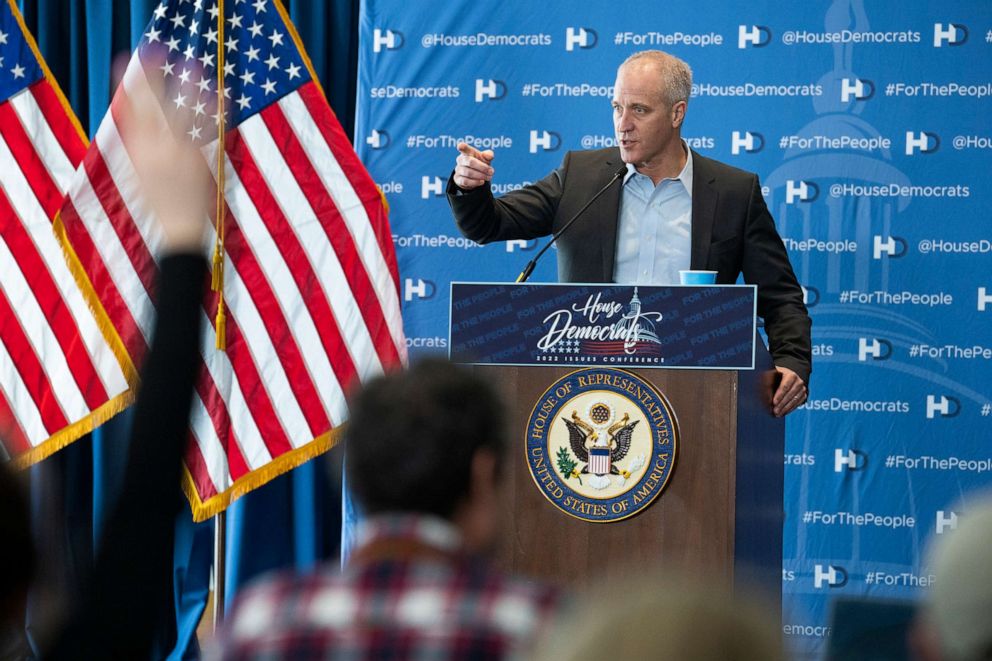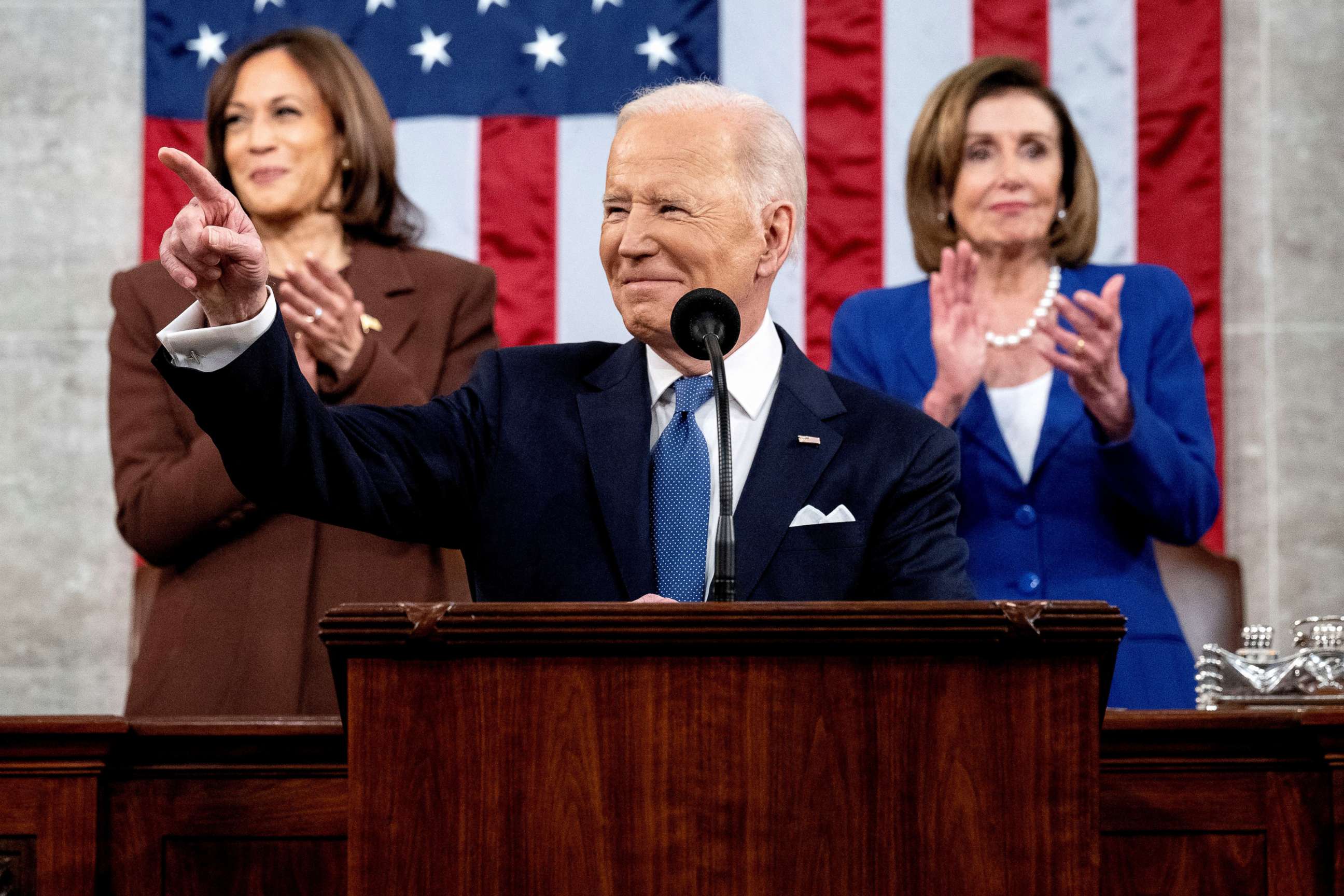Biden tells House Democrats to do better job selling agenda ahead of midterms
Democrats are on retreat in Philadelphia focusing on their message for the fall.
The last time Democrats gathered in-person for a caucus retreat, in 2019, the House majority crafted an agenda centered on plans for a bipartisan infrastructure bill and lowering prescription drug prices.
Three years later, with full control of Congress and the White House, but facing historic headwinds in the midterm elections, an ongoing pandemic and record-high inflation, Democrats argued that they had a substantive record to sell to voters, even if their agenda remained unfinished.
"If our agenda is incomplete it doesn't mean we are broken, it means we have to keep working," Rep. Sean Patrick Maloney, D-N.Y., the chair of House Democrats' campaign committee, told reporters Thursday. "We know what the stakes are."
Last year, President Joe Biden signed a $1.2 trillion infrastructure plan into law with bipartisan support, clearing the way for repairs to America's aging roads, bridges and airports and new investments in broadband.
But the larger social policy plan has been stuck on Capitol Hill, with progressives in the House and several moderate Democrats in the Senate at odds over its scope and scale.
In his State of the Union speech, Biden, who traveled to Philadelphia on Friday to address the caucus, reframed his policy agenda as a plan to fight inflation, and urged lawmakers to revisit lowering prescription drug and child care costs.
In remarks to the caucus on Friday, Biden also said Democrats need to do a better job of explaining their agenda to voters.
"The American people who are just trying to stay above water don't understand this," he said. "You tell them about the American Rescue Plan, and they say 'What the hell are you talking about?'"
The president also touted the progress his administration has made in reducing the deficit -- though it was not as well-received as some of his other talking points -- given progressive frustrations about resistance from Sen. Joe Manchin, D-W.Va., and others to the caucus's agenda.
Huddling after a bruising spending bill fight over coronavirus funds that delayed the start of their retreat, Democrats held several sessions with guest speakers and experts on reaching seniors and young voters, national security and immigration.
"We just have to figure it out and see what's possible," Rep. Pramila Jayapal, D-Wash., a leading progressive, said Thursday. "The hard reality of 50 votes in the Senate and 218 votes in the House is the reality we'll have to focus in on."

Biden argued, as many presidents do, that the upcoming midterms would be the "most important off-year election in modern history," warning that defeat in both chambers would leave him only with "a veto pen."
Maloney, who gave members a presentation on the midterm outlook for the party, acknowledged to reporters that although the president's party traditionally loses seats in the midterm elections, Democrats are campaigning on more favorable terrain thanks to unexpected redistricting results that created more districts that were won by Biden in the previous election.
"We came out of redistricting with a better map than the one through which we currently hold the majority," Maloney said, while also acknowledging that Republicans are supported by outside political groups that have outraised their Democratic counterparts.
Rep. Teresa Leger Fernandez, D-N.M., argued that Democrats also have a positive story to tell voters about the state of the pandemic, and can sell the benefits of the American Rescue Plan, the massive Democratic stimulus effort pumped into the economy after the election.
"In November of 2020 it was dark, we could not be with our families, and COVID was raging," she told ABC News. "Now, a year and three months later, we are able to be with family and gather."
Leaders of the Congressional Black Caucus laid out new plans to unveil proposed executive actions that the Biden administration could take to address unfinished agenda items on policing and voting rights, which have also stalled in Congress given GOP opposition and the 50-50 split Senate.
Democratic Whip Jim Clyburn, D-S.C., held out hope that some voting measures Democrats have pushed for could also be included in any potential reforms to the Electoral Count Act put forward by a bipartisan group of senators.
For their part, Republicans have continued to hammer Biden and Democrats over rising gas prices and inflation, unveiling new ads targeting swing-district Democrats and predicting that prices will only increase given the ongoing war between Russia and Ukraine.

Democrats repeatedly acknowledged the problem of inflation and rising prices but have attempted in recent days to reframe soaring gas prices as a result of Russia's invasion of Ukraine -- and a sacrifice that Americans should be prepared to make as the West sanctions Russia and supports Ukraine's democratic government under attack.
"What is the price that we as individuals will want to contribute in solidarity with the Ukrainian people?" Rep. Raul Ruiz, D-Calif., the chair of the Congressional Hispanic Caucus, said Thursday. "If it means paying a few extra cents at the gas tank, then we're willing to pay that."
Maloney also told Democrats they need to think more carefully about how they communicate with voters.
"We need to talk like real people, and pass what I call the Maloney brothers test: If you go home for Thanksgiving and your brothers think you sound like a jerk -- you know, what your grade point average was -- it doesn't matter to them. You have to show up and be a human being," he said.
The president's role in the midterms, Maloney said, is to be the "strong, decent man" who "crushed" his State of the Union address and is "leading the world to stand up to Russian aggression."
ABC News' Armando Garcia and Justin Gomnez contributed to this report.




